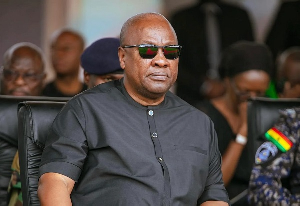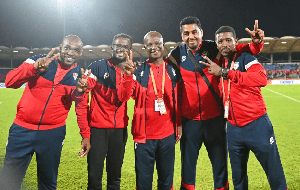– Francis Acquah, Independent Ghanaian
It has come to the attention of Independent Ghanaian, a policy think tank based in Atlanta, Georgia in the United States, that "a highly respected London-based think tank connected with Her Majesty, the Queen of England, has evaluated the 2012 General Elections in Ghana and issues emerging in its aftermath, declaring the polls as the best election held in Ghana since the country returned to multi-party democracy in 1992."
According to the report, Chatham House, the group, which in October 2008, awarded then President John Agyekum Kufuor with its prestigious Chatham House Prize –Crystal and a scroll signed by Queen Elizabeth II – made some very interesting observation about the two dominant political parties at last polls, Nana Akufo-Addo’s failures, John Mahama’s prospects as president and his relationship with ex-President JJ Rawlings.
At a forum held at its offices, Chatham House, on December 19, 2012 in London, one Prof Paul Nuggent, Director of the Centre of African Studies at the University of Edinburgh in Scotland, purportedly intimated that despite the problems encountered by the Electoral Commission (EC) with the biometric identification, last month’s elections were, in his view, the best ever election held in Ghana. Consistent with our independence, our organization wishes to address a few of the remarks presented by Professor Nuggent as we find them to be generous to one party to the detriment of the other.
First, Prof. Nuggent pointed out that although there were more technical problems in the 2012 elections, there had been less manipulation of the process, thus making the results of the 2012 elections more credible. Prof. Nuggent was full of praise for the electoral process and the institutions of State, such as the EC, which had demonstrated their competence to the international community.
We believe the famous all-die-be-die mantra of Nana Akufo-Addo’s, of which we disapproved, interestingly created a higher level of defiance amongst the base of the New Patriotic Party, and thereby prodded them into readiness for mayhem. Based upon the conclusions drawn after talking with some members of the NDC, we believe that aggressive posture by the NPP base may have discouraged the NDC base from approaching the 2012 elections from the standpoint of intimidation. “Why try to affect the vote and risk civil war when you can quietly affect the count,” remarked one cowboy hat-wearing NDC insider. (That is a direct recorded quote) Yet while the election was devoid of violence to the level of the 2008 campaign, the 2012 version witnessed more technical problems which even necessitated a second day of voting.
Thus it is true that the electoral process itself may have been relatively more peaceful than the 2008 election. Still our ground observations indicated a pattern of incumbency abuse with regards to the use of state facilities to create a large disparity in advertising, for example. In addition, state security agencies were used advantageously to NDC candidates in rural areas and the outskirts of Accra such as Ningo-Prampram. There were additional reports of ballot stuffing but those accusations are not exclusive to the 2012 elections, neither are they exclusive to one party.
Prof. Nuggent also indicated that in 2008 there were some unusually high voter turnouts in some constituencies in the Ashanti Region, as much as 98.3 per cent in one instance, as well as credible incidents of violence and voter intimidation. While this may be true, singling out unusual patterns in one region while failing to also point out instances of higher turnout as well as unusual voting patterns such as a candidate with a national stature like Nana Akufo-Addo receiving one out of almost 700 votes cast in one polling station, shows an incredible lack of analytical completeness by a professor.
Prof. Nuggent further proffered that the NDC was always more successful whenever it highlighted its credentials as the party of the ordinary Ghanaian as opposed to the NPP which is portrayed principally as an Akan-dominated party. To counter that image the NPP should have selected a candidate from Northern Ghana as flagbearer, as the NDC had done with the choice of President John Mahama after the death of President John Atta Mills.
We agree with Professor Nuggent that the NDC has been more successful at propagating its credentials as representing the ordinary Ghanaian. However, considering that the most sweeping social interventions in Ghana have been the creations of the NPP, the elephant party has its own self to blame for the prevalence of that myth. Regarding the selection of a member of one particular ethnic group of presidential candidate one can hardly blame a party that opened its primary nomination to over 105,000 of its members. That more democratic form of candidate selection would always ensure that the best candidate within that party would win be him or her Akan, Ewe, Fante, Frafra, Ga, or Gonja to name a few. Furthermore, we may never know if the NDC would have chosen John Mahama in an open and fair primary campaign had he not catapulted to the presidency after Mills’ death.
Drawing a comparison between President Mahama and Nana Akufo-Addo, Prof. Nuggent contended that many Ghanaians regarded the President as an active, dynamic and healthy person, compared to the late President Mills who was viewed by some Ghanaians as unwell, and as a result lethargic in his disposition and style of governance. In the case of the NPP flagbearer, Prof. Nuggent contended that although Nana Akufo-Addo had delivered some brilliant speeches during the election campaign, he [Nuggent] was of the view that the NPP flagbearer came across as a “Winston Churchill type” politician, and as such failed to connect with the electorate, thus leading to his defeat in the polls.
It is widely expected that President Mahama would assume more charge of his administration than Mills ever did. It is also true that he is more healthy and dynamic. But the argument that the one whose party initiated the most sweeping social interventions in Ghana, and himself also proposing free secondary school education to benefit poor children is elitist, but the one who himself enjoyed free education only to oppose that government subsidy to all Ghanaians is more for the ordinary Ghanaian defies common sense.
The election of 2012 is over pending the decision of the Supreme Court. Ghana would be a stronger leader in Africa’s body politics when it is all over unless as a result of the Supreme Court decision, the losing party, whichever it is, decides not to accept the verdict. That is why Independent Ghanaian commends Nana Akufo-Addo for first channeling his grievance through peaceful and legal means rather than inciting violence. We further commend him for going on record to say he would abide by the SC verdict. The Independent Ghanaian calls on President Mahama to also declare his willingness to abide by the SC decision so that his party would be forced to also abide by it.
Opinions of Friday, 11 January 2013
Columnist: Acquah, Francis














